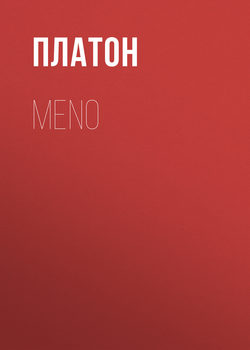Meno

Реклама. ООО «ЛитРес», ИНН: 7719571260.
Оглавление
Платон. Meno
INTRODUCTION
ON THE IDEAS OF PLATO
MENO
Отрывок из книги
Plato's doctrine of ideas has attained an imaginary clearness and definiteness which is not to be found in his own writings. The popular account of them is partly derived from one or two passages in his Dialogues interpreted without regard to their poetical environment. It is due also to the misunderstanding of him by the Aristotelian school; and the erroneous notion has been further narrowed and has become fixed by the realism of the schoolmen. This popular view of the Platonic ideas may be summed up in some such formula as the following: 'Truth consists not in particulars, but in universals, which have a place in the mind of God, or in some far-off heaven. These were revealed to men in a former state of existence, and are recovered by reminiscence (anamnesis) or association from sensible things. The sensible things are not realities, but shadows only, in relation to the truth.' These unmeaning propositions are hardly suspected to be a caricature of a great theory of knowledge, which Plato in various ways and under many figures of speech is seeking to unfold. Poetry has been converted into dogma; and it is not remarked that the Platonic ideas are to be found only in about a third of Plato's writings and are not confined to him. The forms which they assume are numerous, and if taken literally, inconsistent with one another. At one time we are in the clouds of mythology, at another among the abstractions of mathematics or metaphysics; we pass imperceptibly from one to the other. Reason and fancy are mingled in the same passage. The ideas are sometimes described as many, coextensive with the universals of sense and also with the first principles of ethics; or again they are absorbed into the single idea of good, and subordinated to it. They are not more certain than facts, but they are equally certain (Phaedo). They are both personal and impersonal. They are abstract terms: they are also the causes of things; and they are even transformed into the demons or spirits by whose help God made the world. And the idea of good (Republic) may without violence be converted into the Supreme Being, who 'because He was good' created all things (Tim.).
It would be a mistake to try and reconcile these differing modes of thought. They are not to be regarded seriously as having a distinct meaning. They are parables, prophecies, myths, symbols, revelations, aspirations after an unknown world. They derive their origin from a deep religious and contemplative feeling, and also from an observation of curious mental phenomena. They gather up the elements of the previous philosophies, which they put together in a new form. Their great diversity shows the tentative character of early endeavours to think. They have not yet settled down into a single system. Plato uses them, though he also criticises them; he acknowledges that both he and others are always talking about them, especially about the Idea of Good; and that they are not peculiar to himself (Phaedo; Republic; Soph.). But in his later writings he seems to have laid aside the old forms of them. As he proceeds he makes for himself new modes of expression more akin to the Aristotelian logic.
.....
The account of the Platonic ideas in the Meno is the simplest and clearest, and we shall best illustrate their nature by giving this first and then comparing the manner in which they are described elsewhere, e.g. in the Phaedrus, Phaedo, Republic; to which may be added the criticism of them in the Parmenides, the personal form which is attributed to them in the Timaeus, the logical character which they assume in the Sophist and Philebus, and the allusion to them in the Laws. In the Cratylus they dawn upon him with the freshness of a newly-discovered thought.
The Meno goes back to a former state of existence, in which men did and suffered good and evil, and received the reward or punishment of them until their sin was purged away and they were allowed to return to earth. This is a tradition of the olden time, to which priests and poets bear witness. The souls of men returning to earth bring back a latent memory of ideas, which were known to them in a former state. The recollection is awakened into life and consciousness by the sight of the things which resemble them on earth. The soul evidently possesses such innate ideas before she has had time to acquire them. This is proved by an experiment tried on one of Meno's slaves, from whom Socrates elicits truths of arithmetic and geometry, which he had never learned in this world. He must therefore have brought them with him from another.
.....